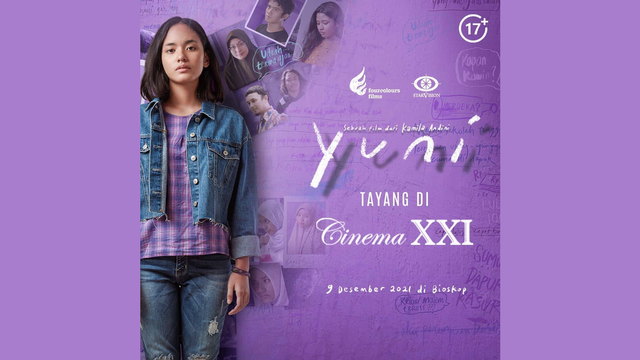Tentang KamiPedoman Media SiberKetentuan & Kebijakan PrivasiPanduan KomunitasPeringkat PenulisCara Menulis di kumparanInformasi Kerja SamaBantuanIklanKarir
2025 © PT Dynamo Media Network
Version 1.102.2
Konten dari Pengguna
"Yuni": Rethinking Youth Engagement
23 Desember 2021 15:13 WIB
·
waktu baca 5 menitDiperbarui 4 Januari 2022 11:29 WIB
Tulisan dari Plan Indonesia tidak mewakili pandangan dari redaksi kumparan

ADVERTISEMENT
I have never in a long time felt so uneasy, yet amazed, by a film and never have I expected that when going to the cinema to watch "Yuni". Beautifully written & directed by Kamila Andini, YUNI centres around a 17 years old girl brought to life by the talented Arawinda Kirana, who struggles with life-changing choices thrown at her by society that holds dear patriarchy, primarily men.
ADVERTISEMENT
"Yuni" has successfully showcased many issues girls face, especially those who live in semi-rural areas in Indonesia, and highlighted how child and early marriage have become normalized when it happens to girls. As a gender advocate working on the child marriage issue in Indonesia for years, it is almost scary how accurate this movie captures the reality of child marriage and how it affects girls' lives. From losing the rights to education, pregnancy risks, domestic violence and being trapped in a cycle of poverty.
To me especially, this movie offers a fresh take to reflect on approaches that have been implemented in child marriage intervention. We tend to think of youth empowerment conventionally. Empowered youth are conceived as articulate, never having any "problems" at schools, having good grades, knowing well what they are going to be in the future and in general just being known as a "good" role model.
ADVERTISEMENT
Despite being the opposite of some of those qualities, Yuni is empowered in her way. She knows what she's good at (math, physics, & music), and her teacher, Lies, knows her potential well, regardless of being known as a "troublemaker" at school. Most importantly, she knows that she doesn't want to get married just yet. However, those are not good enough reasons for a girl to turn down a marriage proposal in many communities, and to understand "why", we need to understand the cause.
Last year's study conducted by Plan Indonesia and Koalisi Perempuan Indonesia (Indonesian Women Coalition) revealed that social factors are the main driving factors of child marriage in 7 districts in Indonesia. Social pressure, for instance, plays a significant role in pushing girls to marry. These issues are well portrayed in Yuni, where her peers and neighbours push her to accept marriage proposals because turning down marriage proposals is commonly considered rude and will bring about bad luck. And another prominent factor is the economy, where marrying off daughters has been deemed a quick and effective solution in cutting down families' economic burden.
ADVERTISEMENT
Many people who decided to marry off their daughters or adolescent girls who agreed to get married early are married off early were trying to look for a quick fix to their problems, whether economic issues or social pressure. The narrative of a better future might be too intangible for them. Let alone knowing not wanting to get married while not having a concrete plan, like what happened to Yuni. So there is a need to close the gap between expectations of young people and perception of empowerment. Thus, we should move past offering outdated solutions for youth empowerment.
To put it into perspective, we already know that one of the causes of child marriage is risky behaviour. Adults tend to think the solution is to empower young people with more "positive" activities. But what exactly are "positive" activities? "Yuni" shared a good example, where music was banned from Yuni's school because it was considered against religious teaching. Other people might find music a favourable medium for young people to explore and express themselves artistically. As long as we, adults, define "positive" activities to empower young people, we will never meet them halfway.
ADVERTISEMENT
Through many interventions thus far on child marriage prevention, youth champions from different parts of Indonesia have been regenerated. Suci, for example, currently the head of Community Based Child Protection Group (KPAD) in West Lombok, West Nusa Tenggara, who has been working tirelessly in preventing and responding to child marriage cases, among other violence against children related cases. Since her early adolescence, she was one of Plan Indonesia's project participants who became empowered through the intervention of a five-year child marriage prevention project.
People like Suci might know best what empowers youth in her community and might have been already doing an intervention at their capacity and resources. And we have to understand that there is no one-size-fits-all approach because every youth community has different contexts and characteristics. Thus, engaging youth champions from respective communities will help the government develop the best-tailored intervention to empower youth.
ADVERTISEMENT
Empowerment is the critical success, but only by partnering with the youth champion movement these champions' and sharing our resources with them and giving them more control in navigating their approach in achieving our shared outcomes of youth empowerment. In the implementation, as peers, these youth champions will help them comprehend the task or skill needed, and peer learning can also develop and strengthen a positive influence among learners, as found in a study by Tai et al. (2014). The peer-to-peer approach by these youth champions will, hopefully, engage more diverse young people so that other self-empowered youth like Yuni can increase their agency and be the champion in her community.
ADVERTISEMENT
An enabling environment should back empowered youth to make their own choices. Government, led by the Ministry of Education, should develop policies and programs to increase scholarships and encourage the improvement of educational infrastructure in poor villages prone to child marriage. Through a child-friendly school programme (Sekolah Ramah Anak), the government shall ensure schools become safe spaces, especially the girls and young women, who are the most vulnerable to child marriage. Thus, no children will ever get expelled for the sake of keeping the school reputation "clean". (***)
Author bylines: Aditya Septiansyah has been a youth advocate for five years, currently working at Plan Indonesia as a campaign and youth engagement coordinator.
ADVERTISEMENT

